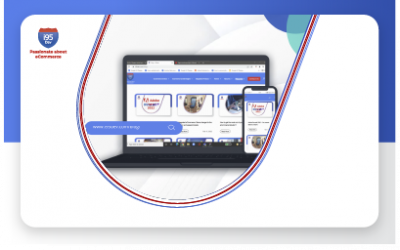May 30, 2022
Why is Integrated eCommerce the
Need of the Hour for the B2B Industry?

The B2B industry is a huge market growing rapidly in the past few years. However, it has been slow to adopt new technologies, but that is changing for several reasons, especially for integrated eCommerce.
Firstly, the rise of eCommerce has made it a necessity for companies to have an online presence. Secondly, advances in technology have made it possible for many businesses to create their websites without the need for an outside vendor.
Thirdly, the B2B industry has been slow to adopt new technologies due to its reliance on relationships with other business partners instead of consumers. However, with the changing times and strategic needs, this attitude is also changing as more and more businesses are starting to recognize the value of offering online access to their products and services.
Therefore, there is an increasing demand for integrated B2B eCommerce solutions because of the growth of this industry. In this article, we will understand the reasons driving the growing demand for integrated commerce and see why it is the need of the hour for B2B organizations that are aiming to thrive in the upcoming years:
What is Integrated eCommerce in the Context of the B2B Sector?
Integrated eCommerce is an approach to using a single system for online and offline business activities with the primary aim of increasing efficiency. It can be used to integrate online and offline data, streamline processes, and provide real-time insights. Also, it helps increase revenue, improve customer experience, and reduce costs.
It helps B2B companies to increase sales and reduce costs by eliminating the need to manage two separate systems. Integrated eCommerce also improves customer service by making it easier to interact with customers while improving data quality, providing a unified view of inventory, and reducing error rates.
Benefits that are Driving the Demand for Integrated eCommerce among B2B Organizations
The benefits of Integrated eCommerce for the B2B Industry are many, including enhanced customer experience, more efficient business processes, and the ability to target specific customers.
The need for integrated eCommerce for the B2B Industry can be grouped into three categories: Gaining new customers, improving customer retention, and unifying business processes across stakeholders.
Here’s a more detailed view of the benefits that integrated eCommerce solutions offer to the B2B industry are:
- Integrated B2B eCommerce solutions will help reduce operating costs for both buyers and sellers.
- The unified management will improve the B2B customer experience by providing a one-stop solution to their needs.
- Your organization can access better insights into customer behavior, which can be used to improve sales, thus improving conversion rates.
- It helps create a consistent brand image across all channels, which helps build trust and loyalty among customers.
- B2B spec integrated eCommerce also helps improve customer satisfaction and retention rate.
- You can improve customer experience by personalizing content, making it easier for customers to find what they are looking for, and providing them with more relevant information before making their purchase decision.
- With Integrated eCommerce, a business can ensure that its website is appropriately updated and reflects the best practices to take advantage of the latest trends and expand its reach.
Integrating online and offline channels into a single, cohesive customer experience is becoming an essential part of any successful B2B business strategy. Today, consumers are no longer satisfied with just one channel to make a purchase.
Therefore, we can agree that integrated eCommerce for the B2B industry is the need of the hour because it will help integrate and unify the processes for both buyers and sellers.
4 Successful B2B Companies that Demonstrate the Synergy of Integrated eCommerce Solutions
In this section, we will have a look at four examples of highly successful B2B companies that have benefited from integrated eCommerce:
#1 General Electric
GE is one of the largest B2B corporations globally, with an extensive product portfolio that covers multiple industries, including the medical sector, aviation industry, capital industrial units, and the renewable energy sector.
The conglomerate continues to excel in the B2B landscape with its gigantic product and business lineup. Its recent marketing initiatives like business-to-human resonate with its long-time strategy like 1999’s “one million hours per year of volunteer service to youth.”
#2 Amazon Business
Amazon is arguably the most recognizable B2C eCommerce company globally, but it is equally massive in the B2B eCommerce segment. So, to help businesses get greater control over their purchase experience, Amazon launched Amazon Business.
It offers benefits similar to Amazon Prime with unique additions for your team, like setting upper limits on spending, availing additional discounts on multi-unit purchases, monitoring buying activities, and getting your orders delivered in a palletized fashion.
#3 Boeing
Yes, you heard it right. Boeing, the world-renowned aircraft company, is also taking long strides in online sales. It recently generated a staggering revenue of $2 Billion in eCommerce sales.
Nonetheless, the aviation industry is dominated by B2B companies to a large extent. Thus, having an integrated eCommerce solution helps Boeing maintain its global priorities and keep its operations in sync with the demand and commitments.
#4 HP Enterprise
The personal computer giant and major B2B eCommerce player HP already sells 50% of its products through eCommerce, and it is planning to launch a subscription-based model. However, it was losing its competitive advantages due to marketplaces like Amazon. Thus, HP decided to move all its products to an online marketplace focusing on B2B business.
Thus, this can be viewed as one of the most significant shifts in the company’s business strategy. It is expected to boost the $63.49 billion revenue significantly in the upcoming days.
Summing Up
Integrated eCommerce Solutions are the need of the hour for this industry because they can help them stay ahead of competitors by providing a more personalized experience to their customers.
If you are looking for an integrated eCommerce vendor for your B2B organization, contact i95Dev now.
Recent Blogs
Enhancing Shipping Precision with Custom Shipping Groups in Adobe Commerce/ Magento
Enhancing Shipping Precision with Custom Shipping Groups in Adobe Commerce/ Magento Author Category Share Three things matter the most when it comes to eCommerce shipping: speed, accuracy,...
Managing Massive Product Catalogs: Why Synchronization is the Key to Efficiency
Managing Massive Product Catalogs: Why Synchronization is the Key to Efficiency Author Category Share The automotive aftermarket industry is vast and highly competitive, requiring businesses...
A Complete Guide to Seamlessly Integrating Adobe Commerce with NetSuite
A Complete Guide to Seamlessly Integrating Adobe Commerce with NetSuite Author Category Share Integrating Adobe Commerce (formerly Magento) with NetSuite ERP can transform the way businesses...







